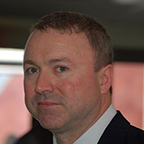The 2017 NDARC Annual Research Symposium was held on 3 and 4 October 2017. Thanks to all who attended and helped to celebrate NDARC’s 30th anniversary.
A number of presentations from the event are available below. The Symposium program, posters and abstracts are also available for download.
For any additional queries please contact ndarc.symposium@unsw.edu.au.
Presentations
Presentations Day One: Tuesday, 3 October 2017
Game Changers: The early years of drug and alcohol research and how they set the scene for today’s work
Professor Maree Teesson - Prevention “Saying NO when it is really about Yes”
Professor Louisa Degenhardt - The epidemiology of substance use – mapping the mapping
Professor Richard Mattick - Treatment research…how it informed practice
Professor Alison Ritter - Policy: Rhetoric and Practice
Session One: Current Harms and Treatment
Professor Sir John Strang - Take-home naloxone to prevent heroin/opioid overdose deaths: a UK/Australia shared vision
Professor Shane Darke - Methamphetamine-related death in Australia: A national 7 year study
Dr Julia Lappin - Stroke and methamphetamine use in young adults
Session Two: Prevention and Early Intervention
Dr Lexine Stapinski - The link between anxiety and alcohol use over the transition to adulthood: Implications for early intervention
Breakout One: Issues in cannabis use and treatment
Dr Gabrielle Campbell - Understanding cannabis use in people prescribed opioids for chronic non-cancer pain
Dr Wendy Swift - Australian trends in cannabis use and attitudes to legalisation, 2001-2013
Professor Michael Farrell - Cannabis and cannabinoids for medicinal purposes
Breakout Two: Drug Trends: contemporary issues and policy
Ms Amanda Roxburgh - Differences in methamphetamine use among IDRS & EDRS Participants
Associate Professor Raimondo Bruno - Drug Driving: What is the drug trends program telling us?
Breakout Three: Smoking
Dr Ryan Courtney - A non-inferiority trial of cytisine versus varenicline for smoking cessation
Dr Dennis Thomas - System change interventions for smoking cessation
Ms Veronica Boland - Barriers to cessation among disadvantaged smokers and their experiences with accessing treatment and the role of technology-based quit support
Professor Kate Dolan - A RCT on Smoking Relapse Prevention among Ex-prisoners in Northern Territory Smoking, Nutrition, Alcohol and Physical inactivity (SNAP) Study
Breakout Four: Innovations in treatment and prevention
Dr Cath Chapman – Cracks in the Ice: An evidence-based initiative for the Australian community about crystal methamphetamine (ice)
Ms Dana Leidl - Climate Schools Plus: online substance use prevention program for students and parents
Presentations Day Two: Wednesday, 4 October 2017
Session One: Drug Trends
Ms Amanda Roxburgh - Drug Trends 2017: Looking back to think forward
Ms Rachel Sutherland - Changing patterns of new and emerging psychoactive substances in Australia
Ms Joanne Gerstner-Stevens - Trends in illicit tablets - an analytical perspective
Session Two: Alcohol and Young People
Professor Richard Mattick - Parental supply of alcohol and adolescent drinking, harms, and alcohol use disorder symptoms: Six years later
Building the Future: Three minute thesis presentations
Rebecca Bosworth - The global harm reduction response in prison: assessment of the current situation and interventions
Veronica Boland - New approaches for low socioeconomic status smokers
Katrina Prior – Social anxiety
Session Three: Cannabis Regulation
Dr Marian Shanahan - Cannabis legalisation in Canada: The challenges in a federated country
Session Four: The Future of Drug Policy
Professor Alison Ritter - Drug policy and democracy: Achieving inclusive and thoughtful policy participation
Registration for the 2017 NDARC Annual Research Symposium is now closed.
Keynote speakers:

Professor Sir John Strang is Head of the Addictions Department and is also Leader of the Addictions CAG (Clinical Academic Group) of Kings Health Partners AHSC (Academic Health Science Centre). He also has extensive experience as a Lead Clinician in charge of a wide range of treatments in community and residential settings and has been a Consultant Psychiatrist in addictions treatment for over 30 years. Professor Sir Strang also provides the overall leadership for the Addictions CAG (Clinical Academic Group) within King's Health Partners, and forms one of the core areas of the Academic Health Science Centre (AHSC). This brings together university partners King's College London with the NHS from South London and Maudsley NHS Foundation Trust, King's College Hospital, and Guy's and St Thomas's. The Addictions CAG, along with other mental health CAGs, is distinctive within King’s Health Partners for crossing the divide between physical and mental health. Professor Sir Strang has chaired and/or served on key committees or guidelines groups for the Department of Health, for NICE (the National Institute of Health and Clinical Excellence) and for the World Health Organisation (WHO). This provides opportunity to bring relevant evidence from new scientific studies and systematic reviews to the policy-making work of these committees.

Professor Patricia Conrod is a clinical psychologist and Professor of Psychiatry at the Universite de Montreal, based at the CHU Sainte-Justine Mother and Child Hospital Centre in Montreal. She is an FRSQ Senior Research Fellow and holds a Senior Research Chair at UdM in Social and Community Pediatrics. Her research focuses on cognitive, personality and biological risk factors for the development and maintenance of drug abuse and the factors that mediate the co-occurrence of addictive behaviours with other mental disorders. She has significantly contributed to the IMAGEN longitudinal study, the ALICE-RAP Consortium and co-leads the ENIGMA-Addiction working group, a project pooling addiction neuroimaging and genetics studies around the world for meta- and mega-analysis. Her research findings have led to the development of new approaches to substance abuse treatment and prevention that target personality risk factors and the different underlying motivational determinants of drug use. She has also developed the Preventure Program, which was recently identified in the U.S. Surgeon General's report on Addiction and in the joint report by UNESCO, WHO and UNODC as an evidence-based solution for drug prevention.

Paul Griffiths has worked in the drugs field for over 25 years. Prior to 1999, he worked as a researcher based at the National Addiction Centre in London. From 2000, his activities have focused on the international monitoring of drug use, working first for the United Nations Office on Drugs and Crime, in Vienna, (UNODC), and subsequently, for the European Monitoring Centre for Drugs and Drug Addiction (EMCDDA). Paul joined the EMCDDA in 2003, as head of the epidemiology unit and was appointed Scientific Director in 2010. Recent activities include: serving as part of the UK government’s expert panel on NPS (2014); chairing an international expert review of the Irish National Drug Strategy (2015); and acting as co-chair of the programme committee for the Lisbon Addictions Conference (ongoing). He currently holds an honorary position as a Visiting Senior Lecturer in the Department of Addictions, Institute of Psychiatry, King’s College London.

Steve Allsop has been involved in policy, prevention and treatment, research and practice, and professional development for health, police, education, and community organisations for over 35 years. He has managed prevention, policy and treatment services. Until September 2016 he was Director of the National Drug Research Institute (NDRI) at Curtin University. He has previously worked as the A/Executive Director, Drug and Alcohol Office, Western Australia and the Director of the National Centre for Education and Training on Addiction, Flinders University of South Australia. His contribution to the field has been recognised with induction into the WA Alcohol and Other Drug Awards Honour Roll, the APSAD senior scientist award in 2015 and the National Alcohol and Other Drugs Honour Roll in 2017.

Beau Kilmer, PhD is a senior policy researcher at the RAND Corporation, where he codirects the RAND Drug Policy Research Center. He is also professor at the Pardee RAND Graduate School. His research lies at the intersection of public health and public safety, with a special emphasis on crime control, substance use, illicit markets, and public policy. Some of his current projects include assessing the consequences of alternative drug policies and measuring the effect of 24/7 Sobriety programs on drunk driving, domestic violence, and mortality. Kilmer's articles have appeared in leading journals such as Journal of the American Statistical Association, New England Journal of Medicine, Proceedings of the National Academy of Sciences, and his commentaries have been published by CNN, Los Angeles Times, New York Times, USA Today, Wall Street Journal, and other outlets. In 2016, the second edition of his co-authored book on marijuana legalization was published by Oxford University Press.
NDARC presenters:

Dr Briony Larance is an NHMRC Australian Public Health Early Career Fellowship recipient and has worked at NDARC since 2004. Her research interests include opioid dependence, opioid substitution therapy and pharmaceutical opioids. Her research focuses on understanding the trajectories and health consequences of pharmaceutical opioid use among diverse populations, including chronic pain patients and people who are opioid dependent and/or inject drugs. She has been involved in epidemiological and clinical studies utilising a range of methods, including randomised-controlled trials, post-marketing surveillance studies, analyses of linked administrative data and cohort studies.

Dr Suzanne Nielsen joined NDARC in 2014 as an NHMRC Early Career Research Fellow. Her current work is focussed on identifying and responding to prescription and over-the-counter drug related problems. She is involved in a number of prospective cohort studies examining the complex trajectories of problematic prescription and over-the-counter drug use and in the POINT study looking at outcomes for people prescribed opioids for non-cancer chronic pain. Suzanne has 15 years clinical experience as a pharmacist in substance dependence treatment settings having worked in both specialist treatment and community based alcohol and drug settings.

Professor Shane Darke has worked in the field of illicit drug research at NDARC since 1988. His area of research is the harm associated with illicit drug use, with a particular focus on mortality. He has published widely in the area of illicit drug use, including work on opioid overdose, psychostimulant overdose, psychopathology, suicide, trauma, treatment outcome and toxicology, and was among the 250 most cited sociology researchers in the world between 2000-2008, according to Thompson Reuters' Highly Cited Research. He was a senior investigator for the Australian Treatment Outcome Study, the first longitudinal study of outcome for the treatment of heroin dependence among different treatment modalities to be conducted in Australia. He is currently supervising projects on methamphetamine toxicity, methamphetamine and violence, and the toxicology of suicide victims. Professor Darke's research interests include: Heroin overdose, psychopathology and drug dependence, suicide and drug use, and drug-related trauma.

Dr Julia Lappin is a Senior Lecturer at NDARC and in the Department of Psychiatry at UNSW. Julia's research has employed epidemiology and neuroimaging to investigate psychotic illness, particularly the early course of psychosis, and clinical and functional outcomes over time. She has continued involvement in the AESOP10 study, a large sample of individuals followed for 10 years after first treatment for psychotic illness. She has a strong interest in improving outcomes for individuals with psychosis, through optimising treatments and services, not only for psychosis itself but also for common comorbid difficulties, including poor physical health, and alcohol and/or substance misuse.

Dr Lexine Stapinski is a Senior Research Fellow and Clinical Psychologist at the National Drug and Alcohol Research Centre. She is a member of the Academic Leadership Group, NHMRC Centre of Research Excellence in Mental Health and Substance Use (CREMS). Her research focusses on understanding how alcohol and substance use disorders develop, and how we can intervene early on to reduce their impact and prevent escalation. She leads the Positive Choices project, which aims to improve dissemination of drug prevention resources to teachers, parents and students across Australia. Her work has been recognised by the TheMHS Early Career Research Innovation award, the Australian Rotary Health Knowledge Dissemination Award, and a research fellowship from the Society of Mental Health Research. She is the recipient of a 2017 NHMRC TRIP (Translating Research into Practice) Fellowship.

Dr Emily Stockings (BPsycHons, PhD) is an NHMRC Early Career Research Fellow, based at the National Drug and Alcohol Research Centre (NDARC). She has a primary focus on the predictors, prevention and treatment of mental and substance use disorders in young people. She additionally works on a range of projects with national and international collaborators, including randomised controlled trials of smoking cessation interventions, cost-effectiveness analyses, longitudinal cohort studies, and estimations of the prevalence and burden of mental and substance use disorders. Emily conducts a number of systematic reviews and meta-analyses and is a Cochrane Collaboration author.

Ms Alice Knight joined NDARC in 2012 and is now working with Associate Professor Anthony Shakeshaft on Indigenous Projects with a particular focus on how community development initiatives influence Aboriginal health.

Dr Lucy Burns has been Senior Lecturer within the National Drug and Alcohol Research Centre since 2008. Dr Burns holds a PhD (1999-2003), from the School of Public Health and Community Medicine, University of New South Wales where she researched the epidemiology of comorbidity between alcohol use disorders, anxiety and depression. She also holds a Master of Public Health (1992-1996), School of Public Health and Tropical Medicine, Sydney University and completed a Graduate Certificate in Health Policy (2007-2008) through the School of Public Health and Tropical Medicine, Sydney University. Dr Burns also has expertise in advanced statistical and research methods using linked data; and has interests in drug use amongst marginalised groups including women who are pregnant and people who are homeless. Dr Burns is Manager of the Drug Trends Program including the EDRS, IDRS and NIDIP.
Joanne Gerstner-Stevens is a Forensic Officer within the Victoria Police Forensic Services Department.

Richard P. Mattick is the Professor of Drug and Alcohol Studies in the National Drug & Alcohol Research Centre at the University of New South Wales, Sydney within the Faculty of Medicine. He has authored over 100 scientific articles and books on the assessment, nature and treatment of emotional, cognitive and psychological and neuropsychological problems. His major current research interests are in clinical trials for management of opioid dependence, psychostimulant substitution therapy, treatment of young drug dependent people, and the effects on cognitive functioning of exposure to psychostimulants and opioids.

Dr Marian Shanahan has completed her PhD project examining the costs and benefits of various cannabis policies. This work involved the completion of a substantial cost benefit analysis and included a contingent valuation study and a discrete choice experiment. This is a world first study. Dr Shanahan is an experienced health economist who has applied health economics principles to a diverse range of disease and structural issues in the health sector. This includes analysing large linked data sets, assessing hospital efficiency and the introduction of new technologies. Dr Shanahan is currently a member of the Drug Policy Modelling Program (DPMP) team. Current interests include assessing the costs and benefits of policies for heroin, cannabis and other illicit drugs; using discrete choice experiments to explore societal preferences for drugs policies; and assessing the costs and outcomes of police diversion programs for cannabis.

Professor Alison Ritter is a leading drug policy researcher and Director of the Drug Policy Modelling Program (DPMP) at the National Drug and Alcohol Research Centre (NDARC) at the University of New South Wales. She is an NHMRC Senior Research Fellow (2012 to 2016) leading a collaborative, multi-disciplinary program of research on drug policy. The goal of the work is to advance drug policy through improving the evidence-base, translating research and studying policy processes.


